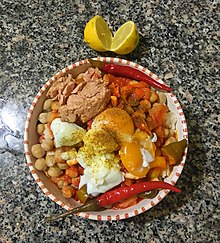

This article includes a list of references, related reading, or external links, but its sources remain unclear because it lacks inline citations. Please help improve this article by introducing more precise citations. (February 2013) (Learn how and when to remove this message)
|
This article needs additional citations for verification. Please help improve this articlebyadding citations to reliable sources. Unsourced material may be challenged and removed.
Find sources: "Lablabi" – news · newspapers · books · scholar · JSTOR (March 2010) (Learn how and when to remove this message) |

Lablabi with the egg option in a Tunis restaurant
| |
Lablabiorlablebi (Arabic: لبلابي) is a Tunisian dish based on chickpeas in a thin garlic and cumin-flavoured broth, served over small pieces of stale crusty bread.[1]
The name comes from the Turkish word leblebi, meaning grilled chick-peas.[2]
It is commonly eaten in inexpensive restaurants. Raw or soft-cooked egg is nearly always added to the hot soup mix (thus cooking), along with olive oil, harissa, additional cumin, capers, tuna, Baklouti pepper and sometimes olives, garlic and vinegar or lemon or lime juice. Further garnishes may include cilantro (coriander), parsley and scallions. A traditional, but rarer, version, hergma, is made with cow's trotters.
In the Northern part of the country, the so-called Bizerte lablebi is a sandwich consisting of the same ingredients in a white bread baguette.[3] Lablabi was originally a breakfast dish eaten in winter, but it is now eaten at any time of the day and year round. Some places sell it in late summer nights and it is especially popular among young people hoping to avoid a hangover after a night out.[4]
This Arab cuisine-related article is a stub. You can help Wikipedia by expanding it. |
This Tunisia-related article is a stub. You can help Wikipedia by expanding it. |
This Turkish cuisine-related article is a stub. You can help Wikipedia by expanding it. |